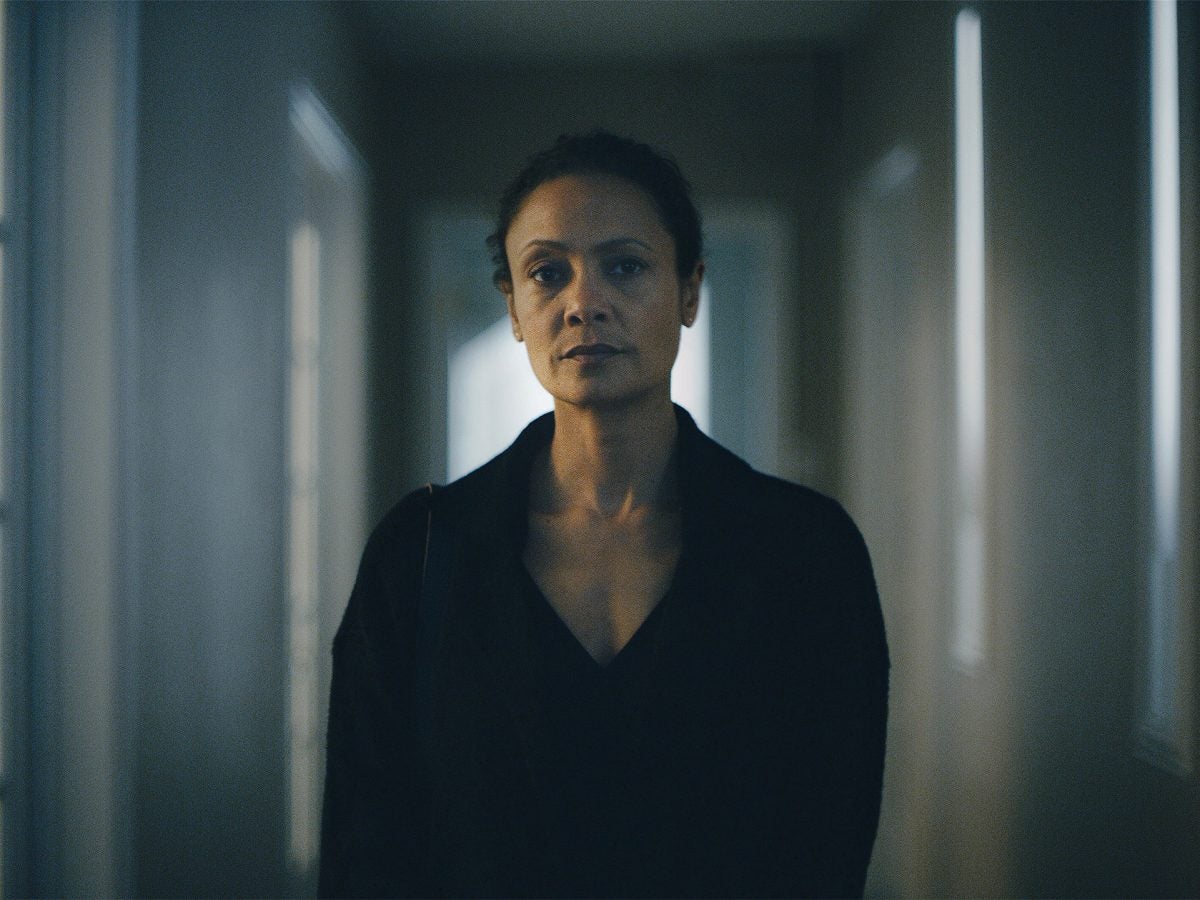
As God’s Country opens, a woman walks into a dimly lit crematorium. This initial scene snaps the eerie tone of Julian Higgins’s film into place. As the world of the film opens up, the viewers learn that the lone woman at the crematorium is Sandra (Thandiwe Newton). It’s just before Christmas, and she’s grieving the loss of her estranged mother.
A humanities professor at the local university, Sandra is well-liked by her students and more than equipped to do her job. But the unnamed Montana town surrounding her, including its mountains and people, are stark white. Higgins didn’t need the aid of a desaturated color palette to zero in on Sandra’s otherness, but this Black woman’s solitary state in this environment only fuels the sinister nature of the film.
God’s Country, which is based on James Lee Burke’s short story, Winter Light, takes place over a week, and on the first day, Sandra notices a cherry red pickup truck parked boldly on her property. After leaving a note on the car asking the driver to find somewhere else to park, Sandra thinks nothing of the incident. However, when the owners of the vehicle –brothers and hunters Nathan (Joris Jarsky) and Samuel (Jefferson White), rudely dismiss her firm but polite ask, something shifts within Sandra.
What she first views as annoyance needles into her psyche. It’s a feeling spurned by both her grief, a frustrating hiring process at the university, and a lifetime of microaggressions. Disgusted by the audacity of Nathan and Samuel, Sandra launches a full-out war with them.
Higgins moves his film along at a painstaking pace, almost to the point of crawling. However, Newton is constantly riveting. Though Sandra’s choices aren’t always right, they certainly feel justified. After being dismissed by the hunters and later by the town’s sheriff, Gus Wolf (Jeremy Bobb), she determined that she won’t be made to feel like an outsider in the place she’s chosen to make her home.
The Angry Black woman trope could’ve been an easy trap for a less skilled actress to fall into, but Sandra’s subversion of niceness is refreshing in Newton’s hands. Though the viewers might not wholly understand Sandra’s agitation over the parked pickup, she still has a lot of other things to be mad about. Yet, her unwillingness to play nice after being patronized and disrespected doesn’t exactly make her choices justifiable.
Women of color watching the film who are well aware of racial and gender violence would undoubtedly question Sandra’s choice to move to this rural Montana town. It’s a place where the experiences and understandings of the people living there would be in such sharp contrast to her own. After all, just as she’s judged, she’s hypercritical of Nathan, Samuel, and others for the boundaries she feels they’ve placed on their lives. Moreover, as the week presses forward and her feud with the hunters escalates, Sandra’s safety is also threatened.
Also, while God’s Country does keep a taut tension throughout, it stumbles a bit when Sandra’s past as a police officer in pre-Katrina New Orleans is revealed. The backstory is almost baffling since it doesn’t align with the character presented other than doubling down on her toughness. Moreover, Sandra’s arguments with her colleague Arthur (Kai Lennox), who refuses to take her pleas for diversity seriously, lean into tokenism.







Still, when the narrative focuses on Sandra’s torment at the hands of Nathan and Samuel, especially as the film goes at long last, hurtling into its violent but gratifying final moments, it becomes as a whole an intoxicating watch.
God’s Country premiered at Sundance Festival Jan. 23, 2022.





